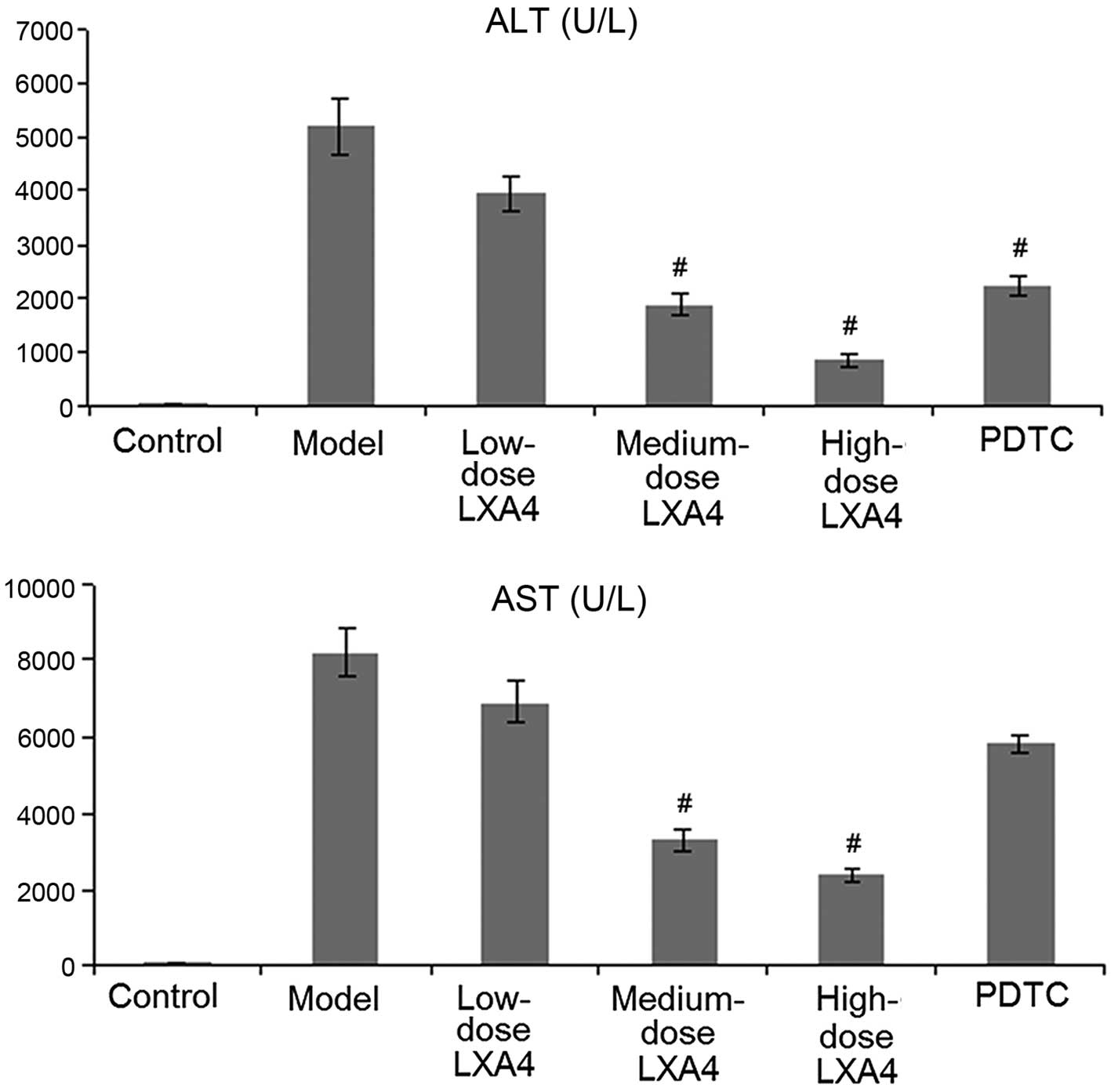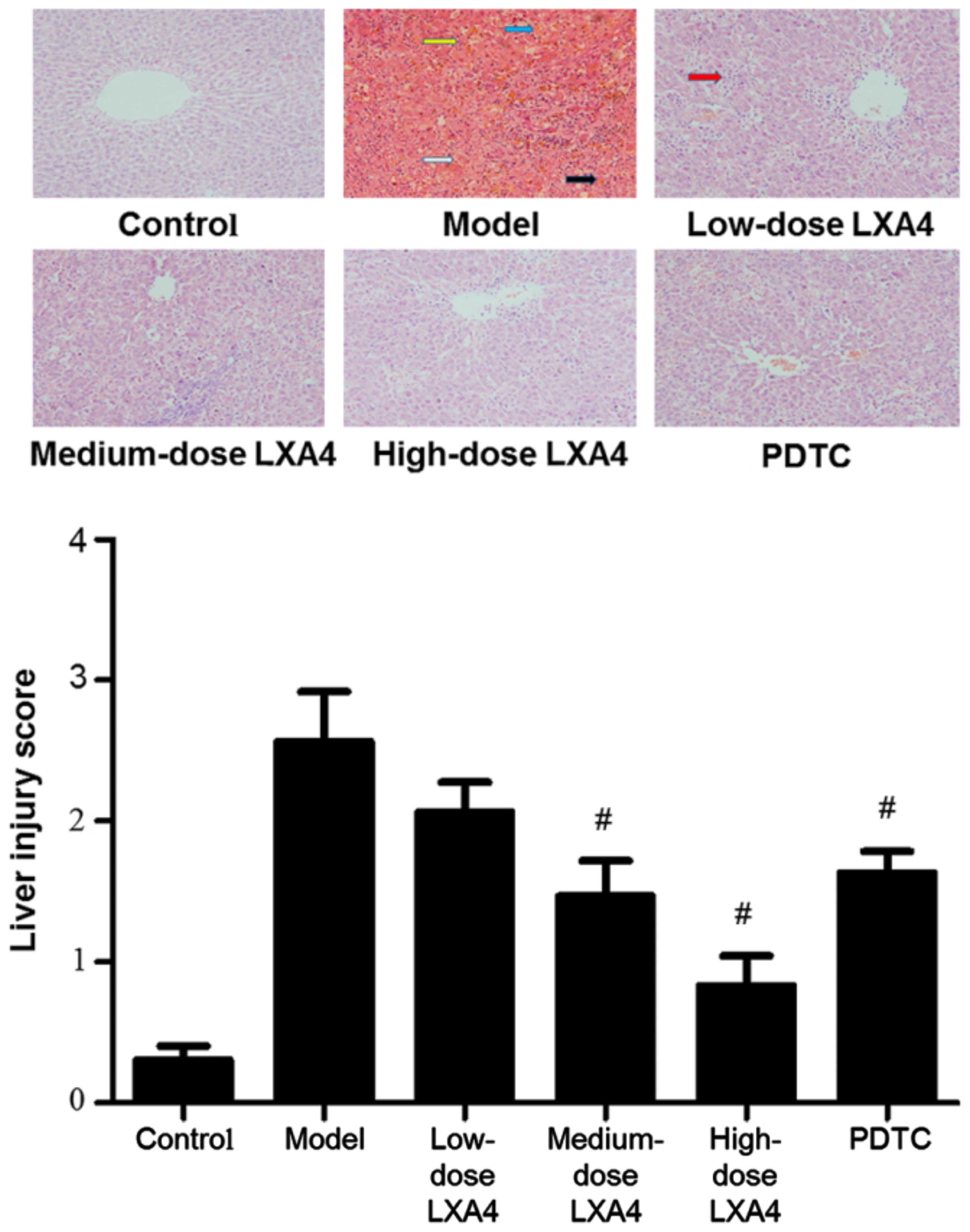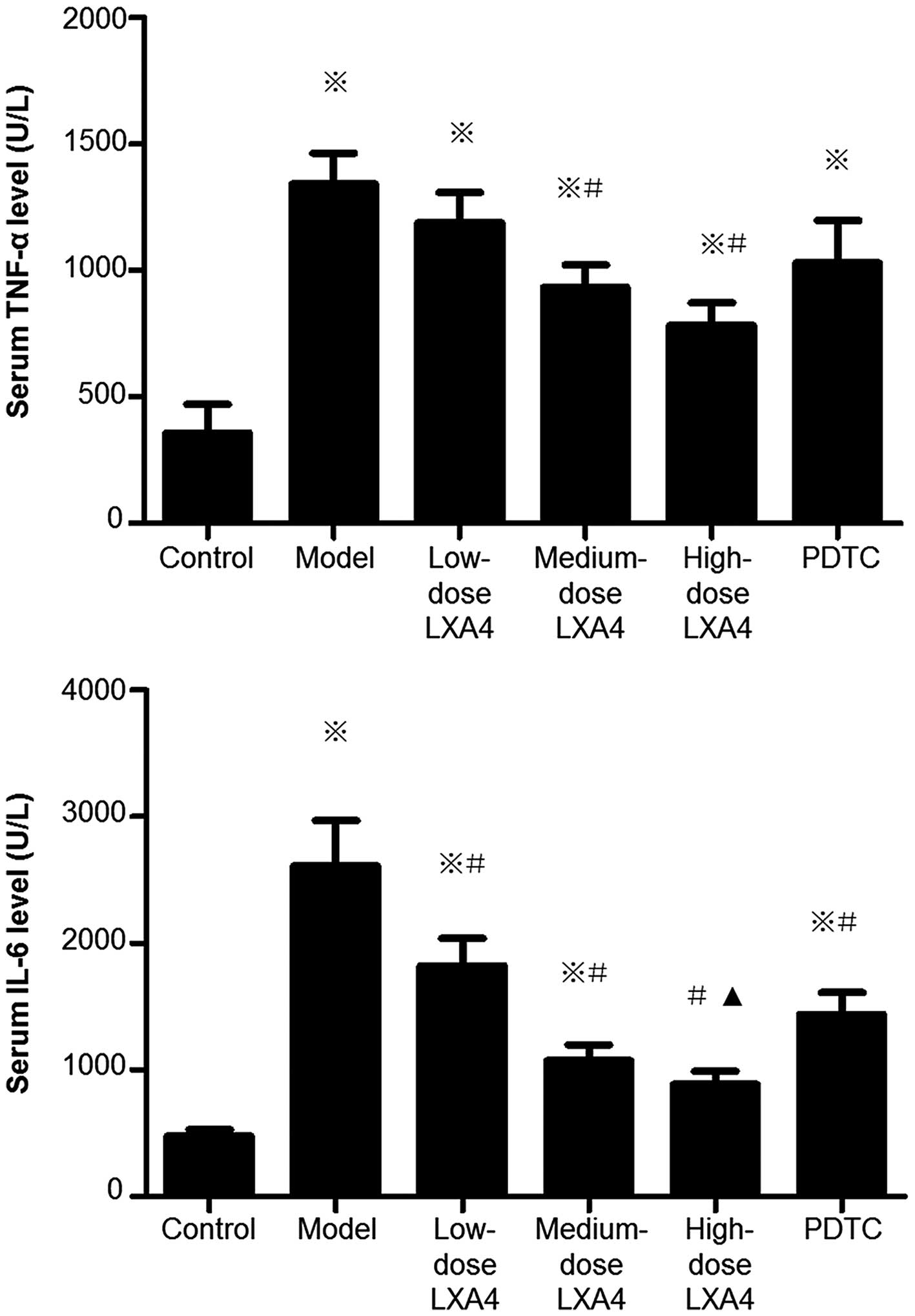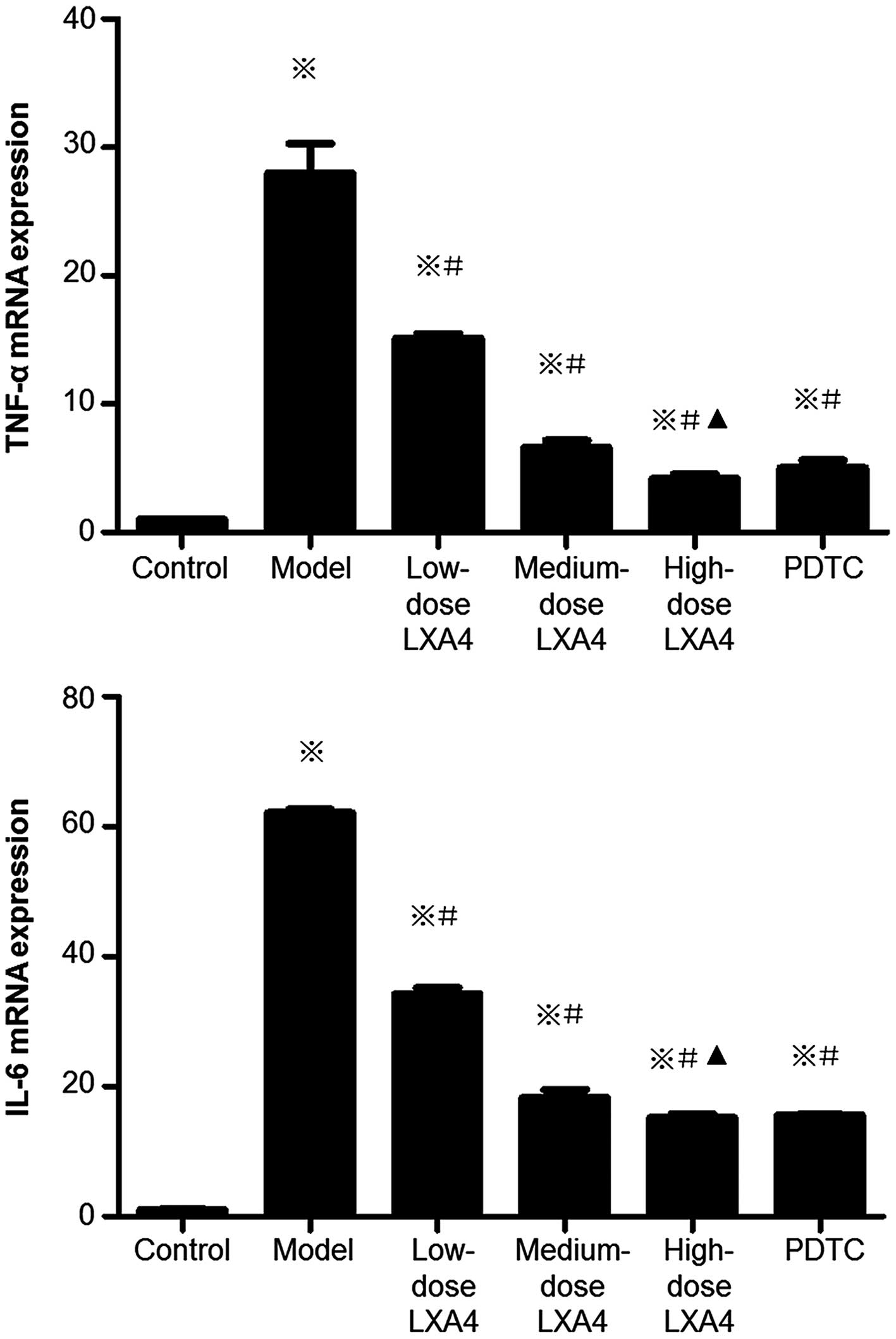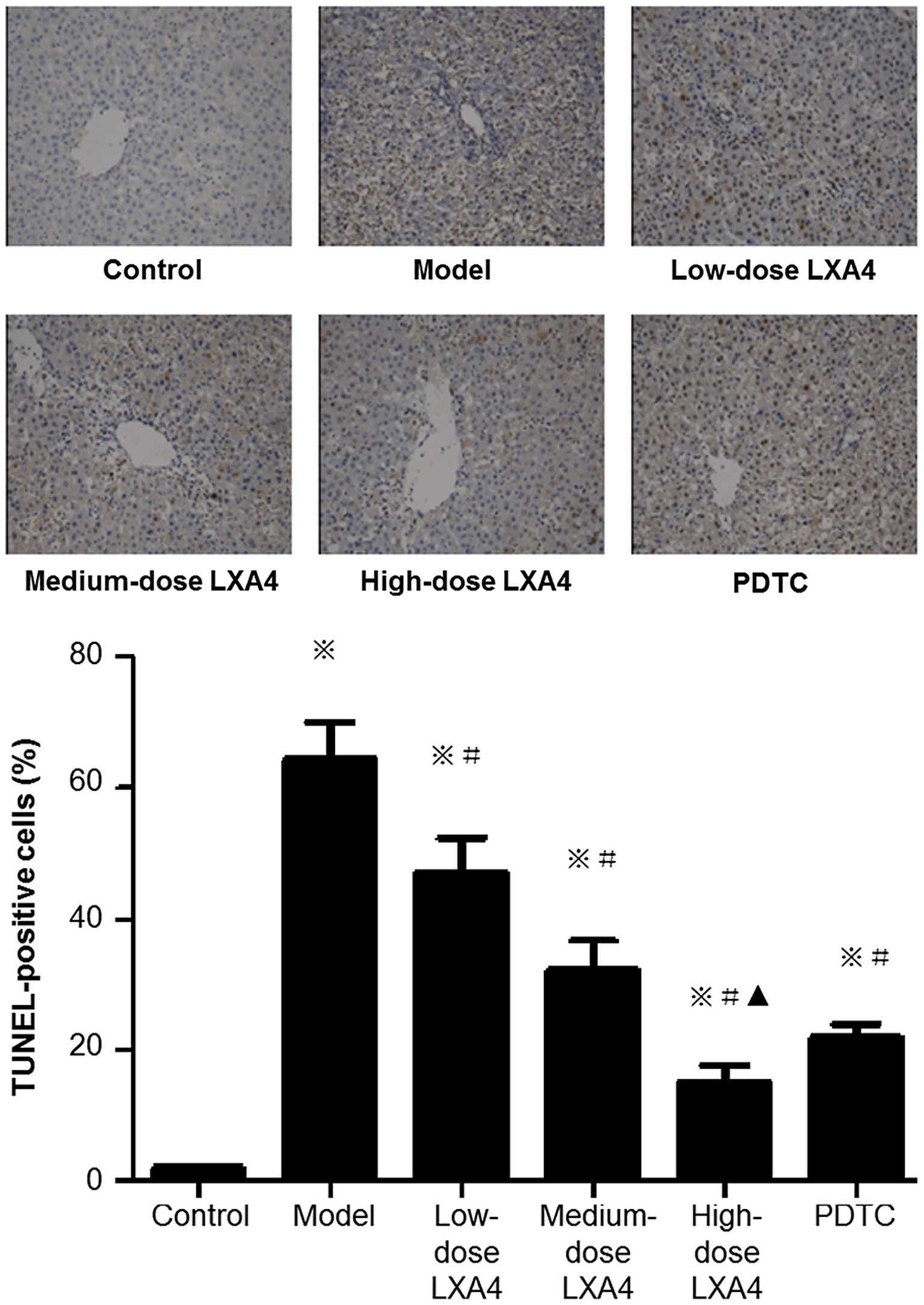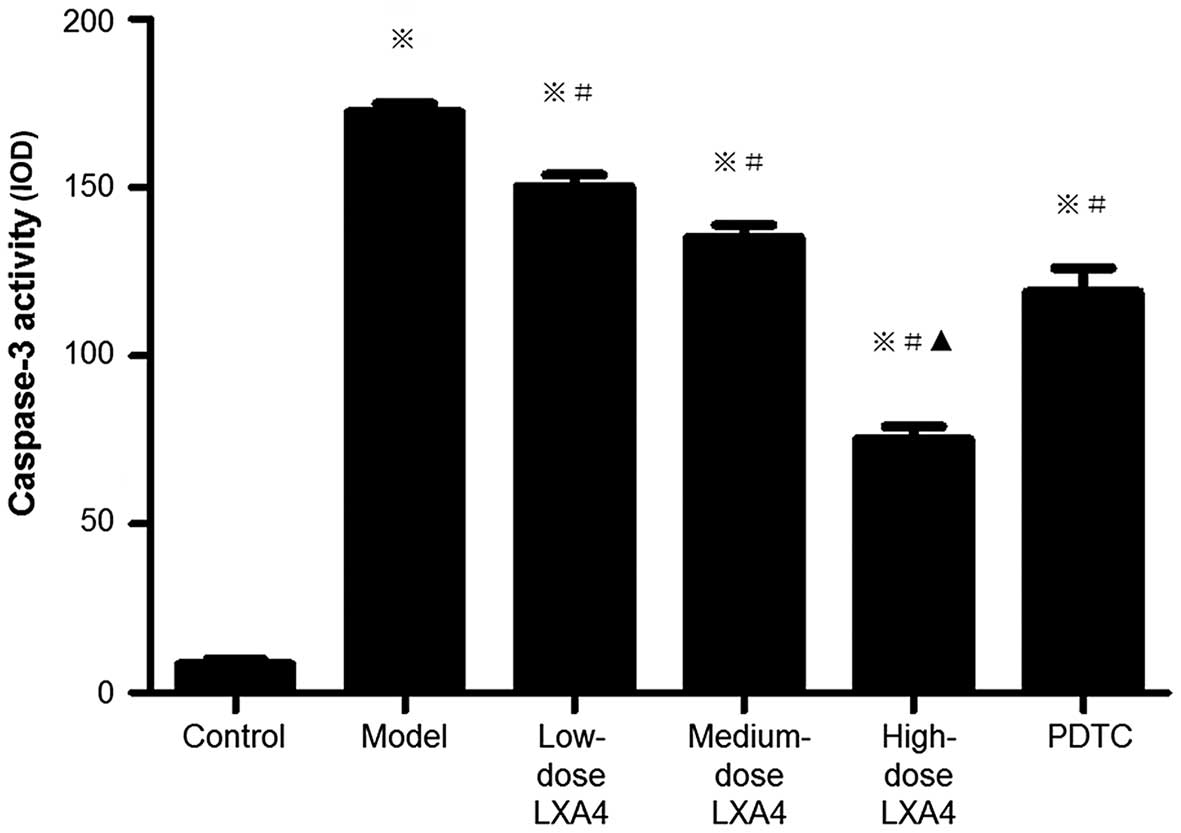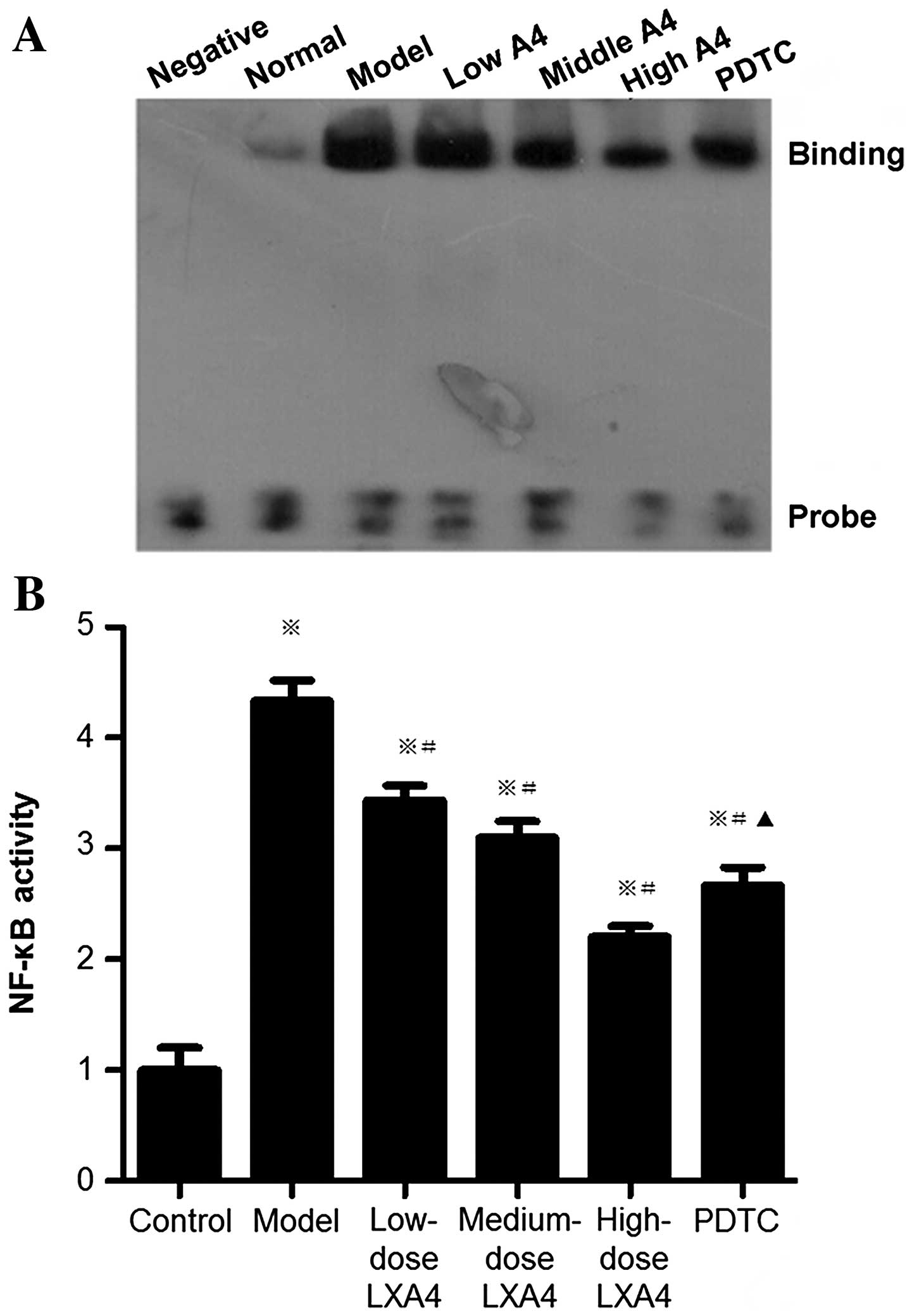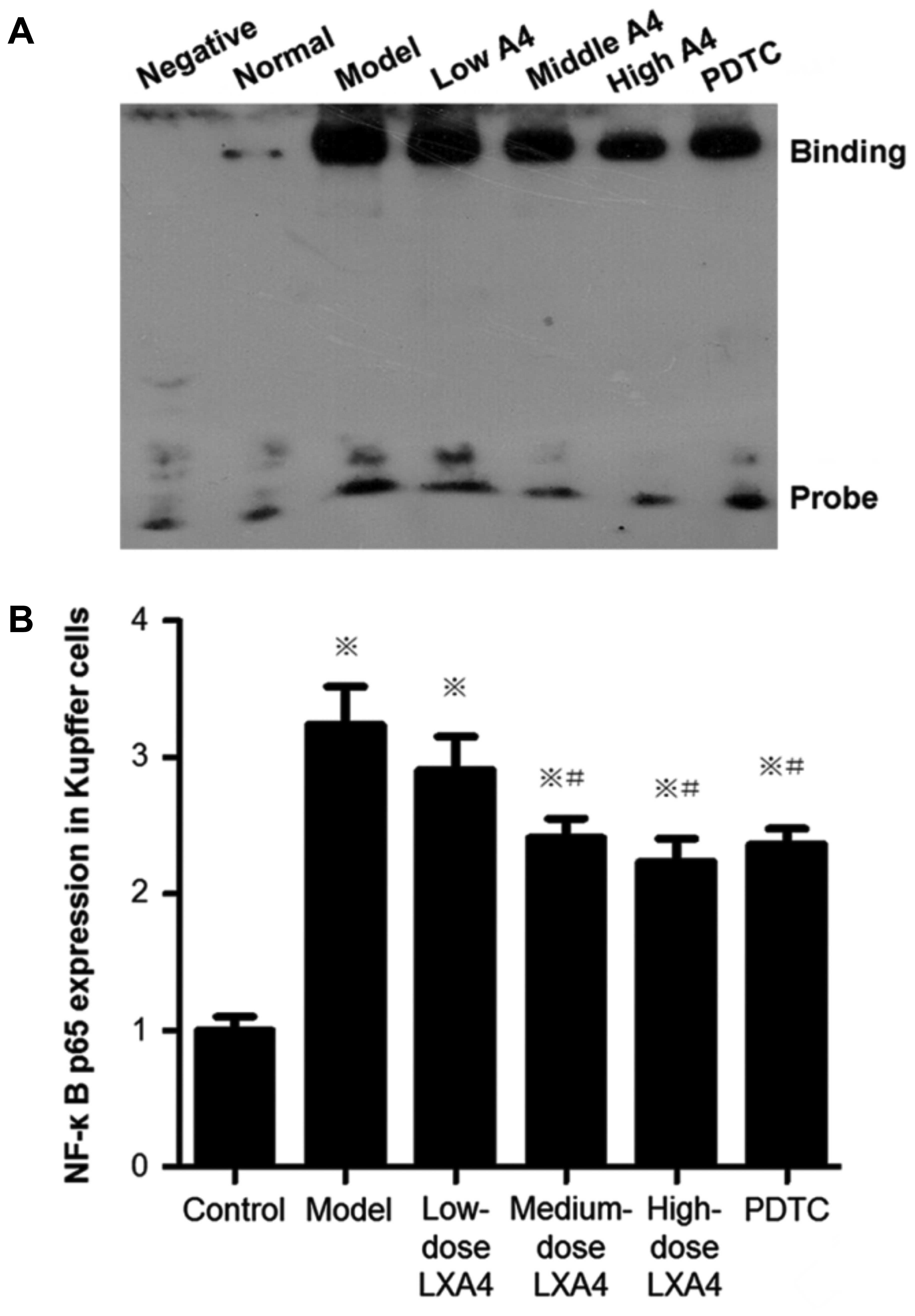|
1
|
Panackel C, Thomas R, Sebastian B and
Mathai SK: Recent advances in management of acute liver failure.
Indian J Crit Care Med. 19:27–33. 2015. View Article : Google Scholar : PubMed/NCBI
|
|
2
|
Bernal W, Auzinger G, Dhawan A and Wendon
J: Acute liver failure. Lancet. 376:190–201. 2010. View Article : Google Scholar : PubMed/NCBI
|
|
3
|
Serhan CN: Pro-resolving lipid mediators
are leads for resolution physiology. Nature. 510:92–101. 2014.
View Article : Google Scholar : PubMed/NCBI
|
|
4
|
Buckley CD, Gilroy DW and Serhan CN:
Proresolving lipid mediators and mechanisms in the resolution of
acute inflammation. Immunity. 40:315–327. 2014. View Article : Google Scholar : PubMed/NCBI
|
|
5
|
Serhan CN, Krishnamoorthy S, Recchiuti A
and Chiang N: Novel anti-inflammatory - pro-resolving mediators and
their receptors. Curr Top Med Chem. 11:629–647. 2011. View Article : Google Scholar :
|
|
6
|
Jin SW, Zhang L, Lian QQ, Liu D, Wu P, Yao
SL and Ye DY: Posttreatment with aspirin-triggered lipoxin A4
analog attenuates lipopolysaccharide-induced acute lung injury in
mice: the role of heme oxygenase-1. Anesth Analg. 104:369–377.
2007. View Article : Google Scholar : PubMed/NCBI
|
|
7
|
Walker J, Dichter E, Lacorte G, Kerner D,
Spur B, Rodriguez A and Yin K: Lipoxin A4 increases survival by
decreasing systemic inflammation and bacterial load in sepsis.
Shock. 36:410–416. 2011. View Article : Google Scholar : PubMed/NCBI
|
|
8
|
Abdelmoaty S, Wigerblad G, Bas DB,
Codeluppi S, Fernandez-Zafra T, El-Awady S, Moustafa Y, Abdelhamid
AD, Brodin E and Svensson CI: Spinal actions of lipoxin A4 and
17(R)-resolvin D1 attenuate inflammation-induced mechanical
hypersensitivity and spinal TNF release. PLoS One. 8:e755432013.
View Article : Google Scholar : PubMed/NCBI
|
|
9
|
Börgeson E, Docherty NG, Murphy M, Rodgers
K, Ryan A, O'Sullivan TP, Guiry PJ, Goldschmeding R, Higgins DF and
Godson C: Lipoxin A4 and benzo-lipoxin A4 attenuate experimental
renal fibrosis. FASEB J. 25:2967–2979. 2011. View Article : Google Scholar
|
|
10
|
Martins V, Valença SS, Farias-Filho FA,
Molinaro R, Simões RL, Ferreira TP, e Silva PM, Hogaboam CM, Kunkel
SL, Fierro IM, et al: ATLa, an aspirin-triggered lipoxin A4
synthetic analog, prevents the inflammatory and fibrotic effects of
bleomycin-induced pulmonary fibrosis. J Immunol. 182:5374–5381.
2009. View Article : Google Scholar : PubMed/NCBI
|
|
11
|
Planagumà A, Kazani S, Marigowda G,
Haworth O, Mariani TJ, Israel E, Bleecker ER, Curran-Everett D,
Erzurum SC, Calhoun WJ, et al: Airway lipoxin A4 generation and
lipoxin A4 receptor expression are decreased in severe asthma. Am J
Respir Crit Care Med. 178:574–582. 2008. View Article : Google Scholar : PubMed/NCBI
|
|
12
|
Xia J, Zhou XL, Zhao Y, Zhu YQ, Jiang S
and Ni SZ: Roles of lipoxin A4 in preventing paracetamol-induced
acute hepatic injury in a rabbit model. Inflammation. 36:1431–1439.
2013. View Article : Google Scholar : PubMed/NCBI
|
|
13
|
Wu SH, Liao PY, Dong L and Chen ZQ: Signal
pathway involved in inhibition by lipoxin A(4) of production of
interleukins induced in endothelial cells by lipopolysaccharide.
Inflamm Res. 57:430–437. 2008. View Article : Google Scholar : PubMed/NCBI
|
|
14
|
Sun T, Yu E, Yu L, Luo J, Li H and Fu Z:
LipoxinA(4) induced antinociception and decreased expression of
NF-κB and pro-inflammatory cytokines after chronic dorsal root
ganglia compression in rats. Eur J Pain. 16:18–27. 2012. View Article : Google Scholar
|
|
15
|
Nishiokada A, Miyoshi M, Fujiwara M,
Aoyama-Ishikawa M, Nishiyama Y, Kai M, Maeshige N, Takahashi M,
Hamada Y, Usami Y and Usami M: Changes of hepatic lipid mediators
associated with intake of high-fat diet for 12 weeks in endotoxemic
rats using LC-ESI-MS/MS. Clin Nutr. 33:S22–S23. 2014. View Article : Google Scholar
|
|
16
|
El-Agamy DS, Makled MN and Gamil NM:
Protective effects of BML-111 against acetaminophen-induced acute
liver injury in mice. J Physiol Biochem. 70:141–149. 2014.
View Article : Google Scholar
|
|
17
|
Zhou XY, Yu ZJ, Yan D, Wang HM, Huang YH,
Sha J, Xu FY, Cai ZY and Min WP: BML-11, a lipoxin receptor
agonist, protected carbon tetrachloride-induced hepatic fibrosis in
rats. Inflammation. 36:1101–1106. 2013. View Article : Google Scholar : PubMed/NCBI
|
|
18
|
Liao W, Zeng F, Kang K, Qi Y, Yao L, Yang
H, Ling L, Wu N and Wu D: Lipoxin A4 attenuates acute rejection via
shifting TH1/TH2 cytokine balance in rat liver transplantation.
Transplant Proc. 45:2451–2454. 2013. View Article : Google Scholar : PubMed/NCBI
|
|
19
|
Hao H, Liu M, Wu P, Cai L, Tang K, Yi P,
Li Y, Chen Y and Ye D: Lipoxin A4 and its analog suppress
hepatocellular carcinoma via remodeling tumor microenvironment.
Cancer Lett. 309:85–94. 2011. View Article : Google Scholar : PubMed/NCBI
|
|
20
|
Knook DL, Blansjaar N and Sleyster EC:
Isolation and characterization of Kupffer and endothelial cells
from the rat liver. Exp Cell Res. 109:317–329. 1977. View Article : Google Scholar : PubMed/NCBI
|
|
21
|
Kono H, Wheeler MD, Rusyn I, Lin M, Seabra
V, Rivera CA, Bradford BU, Forman DT and Thurman RG: Gender
differences in early alcohol-induced liver injury: role of CD14,
NF-kappaB, and TNF-alpha. Am J Physiol Gastrointest Liver Physiol.
278:G652–G661. 2000.PubMed/NCBI
|
|
22
|
Su GL, Goyert SM, Fan MH, Aminlari A, Gong
KQ, Klein RD, Myc A, Alarcon WH, Steinstraesser L, Remick DG and
Wang SC: Activation of human and mouse Kupffer cells by
lipopolysaccharide is mediated by CD14. Am J Physiol Gastrointest
Liver Physiol. 283:G640–G645. 2002. View Article : Google Scholar : PubMed/NCBI
|
|
23
|
Wu Z, Kong X, Zhang T, Ye J, Fang Z and
Yang X: Pseudo-ephedrine/ephedrine shows potent anti-inflammatory
activity against TNF-α-mediated acute liver failure induced by
lipopolysaccharide/D-galactosamine. Eur J Pharmacol. 724:112–121.
2014. View Article : Google Scholar
|
|
24
|
Tuñón MJ, Alvarez M, Culebras JM and
González-Gallego J: An overview of animal models for investigating
the pathogenesis and therapeutic strategies in acute hepatic
failure. World J Gastroenterol. 15:3086–3098. 2009. View Article : Google Scholar : PubMed/NCBI
|
|
25
|
Cosgrove BD, Cheng C, Pritchard JR, Stolz
DB, Lauffenburger DA and Griffith LG: An inducible autocrine
cascade regulates rat hepatocyte proliferation and apoptosis
responses to tumor necrosis factor-alpha. Hepatology. 48:276–288.
2008. View Article : Google Scholar : PubMed/NCBI
|
|
26
|
Tacke F, Luedde T and Trautwein C:
Inflammatory pathways in liver homeostasis and liver injury. Clin
Rev Allergy Immunol. 36:4–12. 2009. View Article : Google Scholar
|
|
27
|
Aroucha DC, do Carmo RF, Moura P, Silva
JL, Vasconcelos LR, Cavalcanti MS, Muniz MT, Aroucha ML, Siqueira
ER, Cahú GG, et al: High tumor necrosis factor-α/interleukin-10
ratio is associated with hepatocellular carcinoma in patients with
chronic hepatitis C. Cytokine. 62:421–425. 2013. View Article : Google Scholar : PubMed/NCBI
|
|
28
|
Głowacki MK, Cieśla A, Cibor D, Owczarek
D, Mach T, Wiliński J and Wiliński B: Selected apoptotic markers in
serum of patients with chronic viral hepatitis C. Przegl Lek.
71:369–373. 2014.
|
|
29
|
Hammam O, Mahmoud O, Zahran M, Sayed A,
Salama R, Hosny K and Farghly A: A Possible role for TNF-α in
coordinating inflammation and angiogenesis in chronic liver disease
and hepatocellular carcinoma. Gastrointest Cancer Res. 6:107–114.
2013.PubMed/NCBI
|
|
30
|
Kiki I, Yilmaz O, Erdem F, Gundogdu M,
Demircan B and Bilici M: Tumour necrosis factor-alpha levels in
hepatitis B virus-related chronic active hepatitis and liver
cirrhosis and its relationship to Knodell and Child-Pugh scores.
Int J Clin Pract. 60:1075–1079. 2006. View Article : Google Scholar : PubMed/NCBI
|
|
31
|
Zou Z, Li B, Xu D, Zhang Z, Zhao JM, Zhou
G, Sun Y, Huang L, Fu J, Yang Y, et al: Imbalanced intrahepatic
cytokine expression of interferon-gamma, tumor necrosis
factor-alpha, and interleukin-10 in patients with acute-on-chronic
liver failure associated with hepatitis B virus infection. J Clin
Gastroenterol. 43:182–190. 2009. View Article : Google Scholar
|
|
32
|
Mao WL, Chen Y, Chen YM and Li LJ: Changes
of serum cytokine levels in patients with acute on chronic liver
failure treated by plasma exchange. J Clin Gastroenterol.
45:551–555. 2011. View Article : Google Scholar
|
|
33
|
Nowak M, Gaines GC, Rosenberg J, Minter R,
Bahjat FR, Rectenwald J, MacKay SL, Edwards CK III and Moldawer LL:
LPS-induced liver injury in D-galactosamine-sensitized mice
requires secreted TNF-alpha and the TNF-p55 receptor. Am J Physiol
Regul Integr Comp Physiol. 278:R1202–R1209. 2000.PubMed/NCBI
|
|
34
|
Huang YH, Wang HM, Cai ZY, Xu FY and Zhou
XY: Lipoxin A4 inhibits NF-κB activation and cell cycle progression
in RAW264.7 cells. Inflammation. 37:1084–1090. 2014. View Article : Google Scholar : PubMed/NCBI
|
|
35
|
Nemeth E, Baird AW and O'Farrelly C:
Microanatomy of the liver immune system. Semin Immunopathol.
31:333–343. 2009. View Article : Google Scholar : PubMed/NCBI
|
|
36
|
Norris CA, He M, Kang LI, Ding MQ, Radder
JE, Haynes MM, Yang Y, Paranjpe S, Bowen WC and Orr A: Synthesis of
IL-6 by hepatocytes is a normal response to common hepatic stimuli.
PLoS One. 9:e960532014. View Article : Google Scholar : PubMed/NCBI
|
|
37
|
Börgeson E, Johnson AM, Lee YS, Till A,
Syed GH, Ali-Shah ST, Guiry PJ, Dalli J, Colas RA, Serhan CN, et
al: Lipoxin A4 attenuates obesity-induced adipose inflammation and
associated liver and kidney disease. Cell Metab. 22:125–137. 2015.
View Article : Google Scholar : PubMed/NCBI
|
|
38
|
Ogushi I, Iimuro Y, Seki E, Son G, Hirano
T, Hada T, Tsutsui H, Nakanishi K, Morishita R, Kaneda Y and
Fujimoto J: Nuclear factor kappa B decoy oligodeoxynucleotides
prevent endotoxin-induced fatal liver failure in a murine model.
Hepatology. 38:335–344. 2003. View Article : Google Scholar : PubMed/NCBI
|
|
39
|
Hoffmann F, Sass G, Zillies J, Zahler S,
Tiegs G, Hartkorn A, Fuchs S, Wagner J, Winter G, Coester C, et al:
A novel technique for selective NF-kappaB inhibition in Kupffer
cells: contrary effects in fulminant hepatitis and
ischaemia-reperfusion. Gut. 58:1670–1678. 2009. View Article : Google Scholar : PubMed/NCBI
|
|
40
|
Hagar HH: An insight into the possible
protective effect of pyrrolidine dithiocarbamate against
lipopolysaccharide-induced oxidative stress and acute hepatic
injury in rats. Saudi Pharm J. 17:259–267. 2009. View Article : Google Scholar : PubMed/NCBI
|















